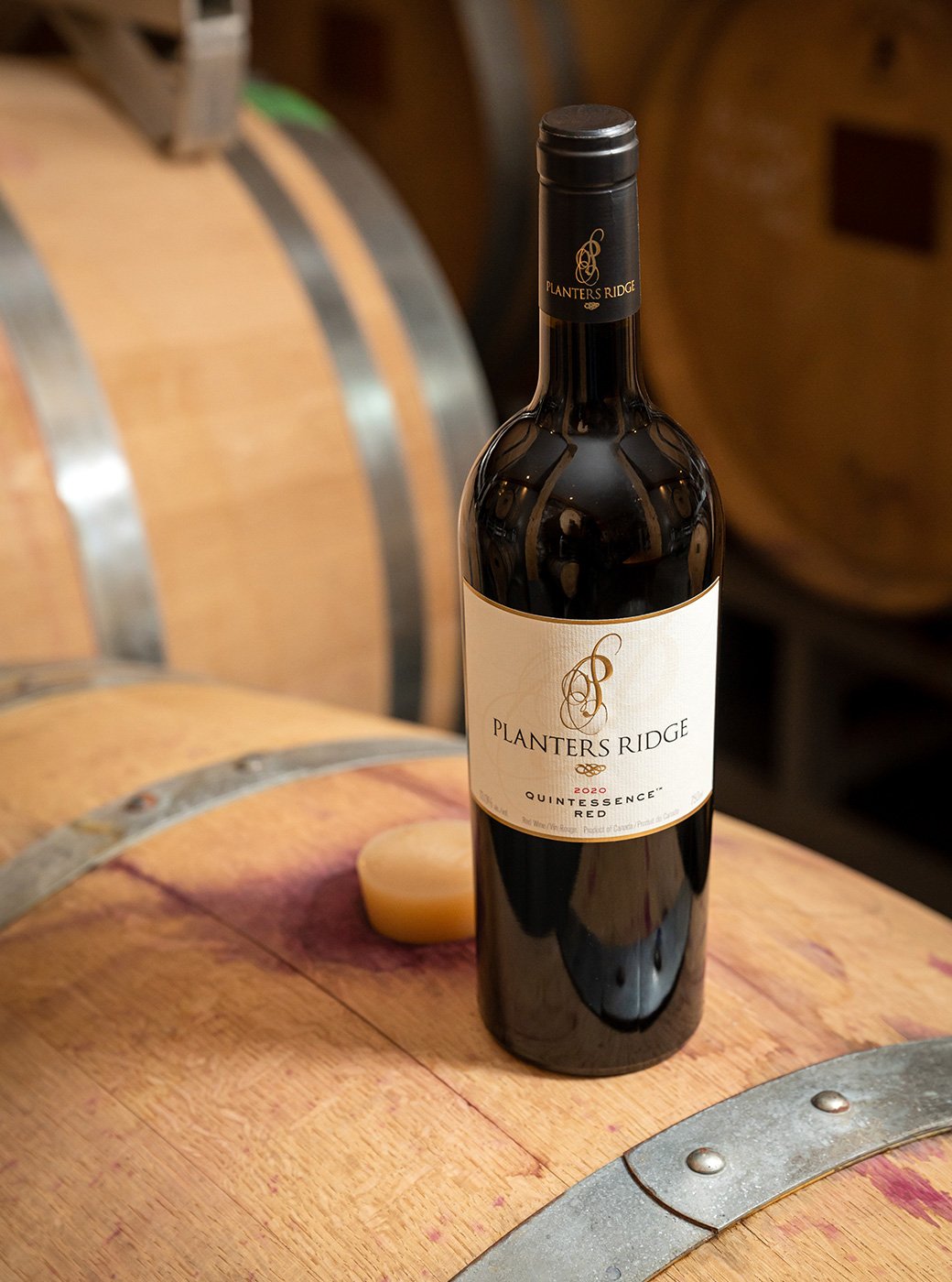Church Street Trio
Church Street Trio
Three Winery Neighbours in Port Williams
BY LOLA AUGUSTINE BROWN
PHOTOS MICHELLE DOUCETTE
Just 10 minutes from downtown Wolfville, Port Williams is home to three unique wineries that have helped make this tiny town a worthy destination. Each offers a different approach to winemaking. You’ll also find Curated Guide favourite, the Noodle Guy, in town, plus two breweries, a distillery, and the Sheffield Mills Eagle Watch is just down the road. Planning a trip to Port Williams is the perfect weekend getaway, where you’ll find something tasty, new, and exciting to sip at every stop.
1365 Church Street Vineyard & Winery
When John and Amber Eikelenboom purchased farmland in Port Williams in 2015, the intention was to start a winery as a retirement gig for John. Amber still runs two successful insurance agencies—that’s where the couple met; Amber sold John an insurance policy. “This was supposed to be his baby, but that did not end up being the case,” says Amber, “And it’s funny because a lot of owners I speak to also thought starting a winery was going to be a retirement thing, and it ended up taking over their lives.”
Amber jokes that her main job is as the drinker of the wine. In reality, she handles a lot of the backend operations such as purchasing and arranging bottling, sales, reporting, “and anything else that needs doing.” John, a lifelong farmer who previously ran a 700-acre dairy farm and then a 26-acre vineyard in the Annapolis Valley supplying grapes to many wineries, handles the growing of the grapes and the winemaking with help from Amber and winemaker Patrick Cantini.
John and Amber Eikelenboom
There have been some bumps in the road for the couple. In 2018 John was diagnosed with lymphoma and battled the disease for three years. At this time, John lost his sense of smell and taste and couldn’t fully appreciate their first crop in 2019. That’s when Amber stepped in as a taster, and although now there are times when John’s senses are fully operational, developing the wines continues to be a team effort.
As a pair of extroverts, the couple loves the social element of running a winery. “Our whole vibe is “welcome to our home,” Amber explains, “We want to know where you’re from, what’s going on? If someone has chosen to celebrate a birthday or engagement by visiting us, that’s a big deal, and we want them to have the best experience. We take time with people.”
In Amber's opinion, the couple's hands-on approach is what makes 1365 Church Street special. “We're involved in literally everything. We grow everything on site, and we make it right here,” she says, “And what makes our wines different is that they are our interpretation of what we think good wine is.”
Though many of the wineries in our region use the same grapes, Amber loves how even with the Tidal Bay wines, there are so many different flavour profiles. “I’m a baker, so I like to compare it to a cookie recipe. I like to put a little extra vanilla in mine, and someone else might add white chocolate chips to their cookies,” Amber says, “It doesn’t mean my cookies are better, they’re just different, and we all enjoy different things.”
As their “retirement gig” continues growing, Amber and John recently added a new tasting bar for events and will offer more food. “We’ve always served locally made cheese and homemade bread with our wines, so it’s an expansion of that,” Amber explains.
Chatting with Amber, it’s clear that there’s nothing pretentious about this couple or how they promote what they do so obviously well. For example, although they hire a sommelier to create tasting notes for each wine, they don’t suggest pairings on their bottles, “Because if you want to eat a big bag of Doritos with our wine, then go for it!”
Amber doesn’t mind that the winery has taken over so much of her life and adores seeing the joy it brings John. “This is his passion,” she says, “If you look at our reviews, so many of them mention John because he's just so happy to share all this that he doesn't want you to leave. I mean, if we had beds, he'd have you stay.”
Beausoleil Farmstead
The new kids on the block, Melanie and Jake Eelman, bought their 21-acre property in 2017, dreaming of creating a table-to-glass cidery and winery. Previously, Melanie was the head cider maker at the Annapolis Cider Company, and both she and Jake grew up on farms in the province. “We are absolutely in love with the authenticity of our small-scale farm-to-glass concept,” Melanie says, “We really do think that we are living the dream. Not every day is a dream, of course, but we couldn’t be happier.”
They planted eight acres of grapes and opened their doors in 2020 with a selection of small-batch wines, ciders, and artisanal vinous ciders (a cider and wine blend)—making their offerings unique among the Church Street trio. These blends celebrate the sweet aromatic apples traditionally grown here for centuries and the cool climate grapes the Annapolis Valley is now known for. “We have a really special little climate here for just knocking it out of the park on these apple varieties, and our wines have that bright acidity. When you blend those, you really end up with something that is special and unique and new and fresh,” Melanie explains, “This is a category that Nova Scotia, in particular, is so well set up to excel in, and that is what we are really exploring here.”
Melanie loves how creative she can be with these blends and says it was important when they were starting to know that they were bringing something different to the local industry. Finding the right blends took time. “As with any new product, it's always a rigorous process. You have to work out where it needs to land, what is the acidity going to be, and all of that,” Melanie explains, adding that plenty of the couples’ family and friends happily volunteered as tasters.
Melanie says visitors to Beausoleil are excited to be drinking something fresh and exciting. “They love the complexity and the nuance and depth that the vinous ciders bring. So they’re akin to wine but coming in at a lower alcohol point, and people are really loving that low alcohol trend right now.”
Melanie Eelman
Beausoleil Farmstead produces more grapes than the winery needs, so they sell to other wineries (including Planters Ridge), but there are no plans to expand their production. “My program is tiny, but my mantra is, how big do you not wanna be? If growth is going to happen for us, it needs to be thoughtful and make sense. I’m really happy with our small scale right now,” says Melanie. They also have a gorgeous AirBnB on the property, which requires more upkeep. And Jake still has a full-time position with Agriculture Canada, so Melanie handles much of the work on the property with assistance from the couple's two teenage sons.
Before buying the property, the Eelmans asked John McLarty and Lisa Law of Planters Ridge about their journey in Port Williams and whether they could achieve what they hoped there. “They’re the pioneers here, and we have the utmost respect for them,” Melanie says, “We’re so excited to be in the space that we're at on this amazing street with Planters Ridge and John and Amber at 1365 Church Street.”
Visitors to Church Street can enjoy a full day visiting the three wineries and have a diverse experience because each location is doing amazing things.
Planters Ridge
John McLarty and Lisa Law were the first winery owners to move to Port Williams, buying 7.5 acres and a 160-year-old farmhouse that would become Planters Ridge. Initially, the couple was looking for a potential retirement project but ended up with a “multi-faceted business.”
“Once you get into winemaking, you’re basically running a manufacturing plant. You have to learn the science of winemaking and the agricultural side of things, but there’s also an art to it,” says John. “Then there’s the financial side of the business, and the retail, and the marketing.” It’s hard but worthwhile work that brings a rich array of rewards.
John McLarty and Lisa Law
Hearing that people love their wines is, of course, hugely gratifying. “One of the most rewarding experiences is when you get people from different parts of the world that really understand wine around saying that they love our wines. That’s when it really hits home,” says John. Accolades frequently happen when the couple visits trade shows in Europe. “We’ve had top international restaurant owners telling us that they want our wines on their menu. In particular, this happened with Noma in Copenhagen, which was considered the top-rated restaurant in the world,” he says (Noma has since closed but is still revered).
John and Lisa have been able to draw on their previous work experiences—John grew up on a farm and was a chemical engineer for most of his career, and Lisa was an accountant—to help grow Planters Ridge. The project has been full of challenges. When they moved to the area, the town was dry, with no alcohol allowed to be produced or sold. “We had to run a plebiscite with the volunteer-run Port Williams Commission to get our proposal approved. Despite being so close to Wolfville, it was like there was a huge mental barrier involved in crossing the Cornwallis River,” John explains. “So we were definitely the groundbreakers here on Church Street. It’s been so good for Port Williams to grow as the other wineries set up here.”
The couple has found the community to be incredibly supportive and welcoming. “At a recent meeting where we applied for permits to expand and add a small restaurant, several members of the commission stood up and said how much they supported what we wanted to do,” John explains. During Covid-19, the winery expanded the deck to accommodate more people, covered that deck, and continued to grow. They have on-site accommodations, host weddings and offer special events, and already have a chef preparing charcuterie boards and light meals. Once they secure a restaurant license, they aim to offer a more complex menu.
Another way that Planters Ridge has expanded is to offer dessert wines, a rummed cider (using rum from Barelling Tide Distillery in Port Williams), and mead (honey wine). “These products are quite popular though they're not necessarily for a broad range of people,” John explains. For instance, the rummed cider sits at 9.5 percent alcohol.
Expansion into these non-winemaking areas was never the initial intention of their business, but John says it feels like a natural progression. “It's really not so much about making a few bottles of wine anymore. As the industry grows in the province, wineries have evolved to become tourism-based businesses because the wine industry is drawing visitors,” he says, “When we sell a couple of bottles of wine, it's not about the $50 that visitors leave behind with us, it's the $1000 that they leave in the province because they came here for two weeks.”












